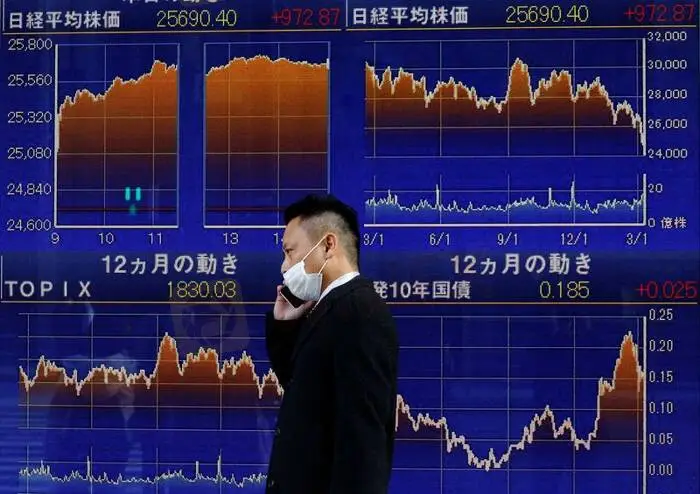简体中文
繁體中文
English
Pусский
日本語
ภาษาไทย
Tiếng Việt
Bahasa Indonesia
Español
हिन्दी
Filippiiniläinen
Français
Deutsch
Português
Türkçe
한국어
العربية
Asian stocks in defensive mood on China and rate worries
Abstract: Asian shares traded cautiously on Tuesday, with investors weighing China’s measures to cushion an economic slowdown and the prospect of aggressive Federal Reserve monetary policy tightening.
Asian shares traded cautiously on Tuesday, with investors weighing Chinas measures to cushion an economic slowdown and the prospect of aggressive Federal Reserve monetary policy tightening

Investors are also bracing for a barrage of earnings that will help them assess the impact of the Ukraine war and a spike in inflation on company financials. Netflix, Tesla and Johnson & Johnson are all to report this week.
Moscow has refocused its ground offensive in Ukraines two eastern provinces but Ukrainian President Volodymyr Zelenskiy has vowed to fight on.
Early in the Asian trading day, MSCIs broadest index of Asia-Pacific shares outside Japan was down 0.5% while U.S. stock futures, the S&P 500 e-minis, were up 0.2%.
Australia‘s S&P/ASX 200 edged up 0.66%, as strong commodity prices lifted mining and energy stocks, while Japan’s Nikkei rose 0.18%.
China‘s blue-chip CSI300 index was 0.06% higher in early trade while the Shanghai Composite Index rose 0.24%. Hong Kong’s Hang Seng index opened down 2.4%, pressured by a slump in tech giants listed in the city amid Chinas latest regulatory crackdown on the sector.
The Peoples Bank of China (PBOC) said on Friday it would cut the reserve requirement for all banks by 25 basis points (bps), releasing about 530 billion yuan ($83.25 billion) in long-term liquidity to cushion a slowdown.
Investors, however, felt the smaller-than-expected cut might not be enough to reverse a sharp slowdown in the worlds No. 2 economy that could significantly affect global growth.
China‘s gross domestic product (GDP) on Monday beat analysts’ expectations with a 4.8% increase in the first quarter from a year earlier, while data on March activity showed weakness in consumption, property and exports affected by COVID-19 curbs.
Analysts said the key question was whether authorities would make adjustments to the tough anti-COVID-19 measures.
“We expect more policy support, mainly in the form of more infrastructure investment, stronger credit growth, and easier property policy. But we do not see the government undertake ‘whatever it takes’ to achieve the 5.5% growth target, nor shift the Covid policy soon,” said Wang Tao, Head of Asia Economics and Chief China Economist of UBS Investment Bank Research.
Wall Street ended the day lower in a choppy trading day on Monday, as investors contrasted Bank of Americas positive quarterly earnings with surging bond yields ahead of further earnings cues this week.
A significant cut to global growth expectations from the World Bank, paired with March weakness in Chinas latest economic numbers injected some pessimism into U.S. markets, which opened Monday following a holiday-shortened previous week.
The Dow Jones Industrial Average ended down 0.11%, while the S&P 500 dipped 0.02% and the Nasdaq Composite slid 0.14%.
Markets were closed on Monday in Australia, Hong Kong and many parts of Europe for the Easter holiday.
The benchmark 10-year Treasury yield was last at 2.845%, after previously hitting 2.884% earlier on Monday, the highest since December 2018, as investors adjusted for the Federal Reserve to raise rates by 50 basis points at its May and June meetings to contain rapid inflation.
The two-year yield, which rises with traders expectations of higher Fed fund rates, touched 2.4459% compared with a U.S. close of 2.46%.
The dollar index, a gauge of the greenbacks value against six major currencies, was up at 100.88 after surging to 100.86 on Monday, the highest since April 2020.
Oil prices were slightly lower on Tuesday, after having been boosted by concerns over tight global supply amid the Ukraine crisis in the previous sessions.
U.S. crude dipped 0.57% to $107.59 a barrel. Brent crude fell to $112.7 per barrel.
Gold prices steadied on Tuesday, after getting within a stones throw of the key $2,000 per ounce level in the previous session.
Spot gold traded at $1,977.18 per ounce. [GOL/]
(Editing by Jacqueline Wong)
Disclaimer:
The views in this article only represent the author's personal views, and do not constitute investment advice on this platform. This platform does not guarantee the accuracy, completeness and timeliness of the information in the article, and will not be liable for any loss caused by the use of or reliance on the information in the article.
WikiFX Broker
Latest News
Webull Partners with Coinbase to Offer Crypto Futures
eToro Expands Nationwide Access with New York Launch
Why Is UK Inflation Rising Again Despite Recent Lows?
Hackers Charged for $11M Crypto Theft Using SIM-Swaps
Role of Central Banks in the FX Market
FCA Alerts Against Sydney FX
What Makes Cross-Border Payments Easier Than Ever?
Trader Exposes Unethical Practices by STP Trading
Interactive Brokers Launches Tax-Friendly PEA Accounts in France
Google Warns of New Deepfake Scams and Crypto Fraud
Currency Calculator


